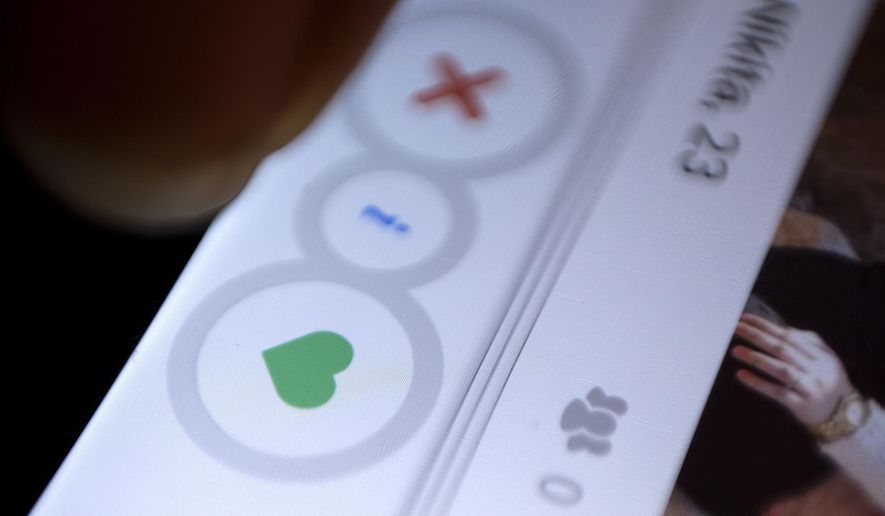Recent reports about meetings arranged on dating apps turning into crimes have prompted police to issue warnings and users to question their safety.
Police in Greenbelt, Maryland, this week have alerted the public about armed masked men who are posing as women on dating apps and luring victims to a “designated location” to rob them. The victims usually are beaten before having their wallets, car keys and cell phones stolen, the police department said Sunday on its Facebook page.
“Citizens are urged to refrain from meeting with strangers using such dating apps,” police said.
Last week in Henrico County, Virginia, police arrested a 21-year-old man in Richmond on charges of meeting up with people he matched with on dating apps and then robbing them. Police tweeted that the suspect, Tylik Davis, had managed to steal money, keys and a car.
The FBI says that romance scams, also called confidence fraud, afflicted 19,473 victims and resulted in a total loss of more than $475 million last year.
“Criminals search dating sites, apps, chat rooms and other social media networking sites attempting to build ‘relationships’ for the sole purpose of getting your money, your personally identifiable information or victimizing you in some other manner,” FBI spokeswoman Tina Jagerson said.
Other victimization includes reports of alleged sexual assaults during meetings arranged via apps, and dating sites are well aware that convicted sex offenders are using their platforms, according to a report published by Columbia Journalism Investigations (CJI) and ProPublica.
The report, published in December, studied more than 150 incidents of sexual assault involving dating apps and found that dating platforms matched their users with someone who had been previously accused or convicted of sexual assault in 10% of incidents.
The majority of incidents, which occurred in the past five years, happened during the app users’ first in-person meeting in places such as parking lots and dorm rooms. Many of the victims, mostly women, met their male attackers through Tinder, OkCupid, PlentyofFish or Match, dating apps all owned by Match Group.
All of the sites indicate in their terms of use that a potential user must not be a felon, but that condition apparently is missed or ignored.
Match Group screens for sexual predators on Match.com, but its other major online dating services do not, the report says. A Match Group spokesperson told the CJI that the company doesn’t collect enough information from its users to implement a uniform screening protocol and acknowledged, “There are definitely registered sex offenders on our free products.”
Asked about dating app safety, Match Group said it became the first dating company to invest in an emergency service. It has partnered with Noonlight, a safety platform app that can trigger requests to emergency services and that provides personal safety products.
Match Group has rolled out Noonlight’s technology to U.S. users across its various apps, starting with Tinder on Jan. 28.
“A safe and positive dating experience is crucial to our business,” said Match Group CEO Mandy Ginsberg. “We’ve found cutting-edge technology in Noonlight that can deliver real-time emergency services — which doesn’t exist on any other dating product — so that we can empower singles with tools to keep them safer and give them more confidence.”
Users can access emergency services and relay location data within the Noonlight feature without having to call 911 or send a text. They can also input details of upcoming dates within a Tinder Timeline feature, including who they are meeting, when they will meet and where they are going.
Tinder also introduced a photo verification feature to compare a posed photo taken in real time to profile photos and an accessible in-app safety center.
“Every day, millions of our members trust us to introduce them to new people, and we’re dedicated to building innovative safety features powered by best-in-class technology that meet the needs of today’s daters,” Tinder CEO Elie Seidman said in a written statement. Facebook added a dating feature in September and said it built protections into its app, including the ability to report and block anyone and to prohibit people from sending photos, links, payments or videos in messages.
“Finding a romantic partner is deeply personal, which is why we built Dating to be safe, inclusive and opt-in,” said a Facebook spokesperson. “People using Facebook Dating can also share details of their upcoming date and/or live location with someone they trust via Messenger. They will be able to control if they want to choose this feature. If they do, they are in control of who they share this information with.”
Aside from app safety features, individuals can take personal actions to try and protect themselves when using dating apps.
The FBI recommends people only use reputable, nationally-recognized dating websites yet to be aware scammers might be on them as well; research photos and profiles in other online search tools and ask questions; do not allow attempts for isolation from family and friends; meet in a public place if planning to meet someone in person; never provide financial information or loan money; and do not blindly believe stories of severe life circumstances or other hardships geared at keeping an individual’s interest.
• Shen Wu Tan can be reached at stan@washingtontimes.com.




Please read our comment policy before commenting.